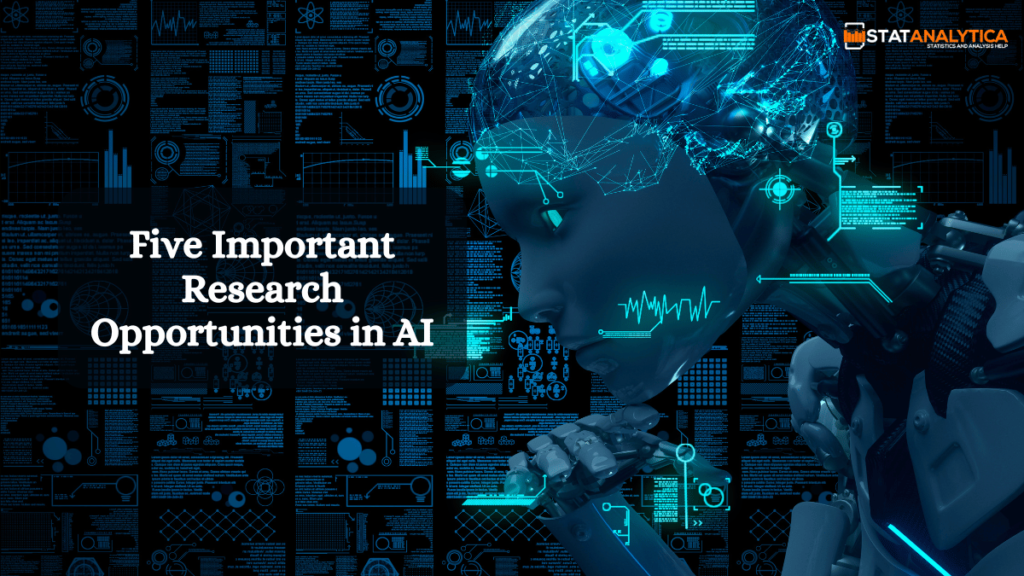AI has been rapidly evolving in the last few years to the point that it has now become a potent and essentially disruptive force across a broad spectrum, including a wide range of industries. This boost in AI can effectively be used for a variety of technological breakthroughs; however, it has also opened the doors to countless important areas for research.
The Most Important Research Opportunities In AI
Table of Contents
AI & Human-Centered Computing
Since AI has opened the doors to many research opportunities, one of them is the opportunity to explore how AI can effectively collaborate with human capabilities instead of replacing or dominating them.
The research scope would be how AI systems can be designed in a way that they are not only user-friendly, empathetic, and adaptive, but they can also be effectively used in collaboration with human capabilities to boost human creativity, human learning, and human decision-making skills.
The question is how to establish reliable and effective human-AI interaction and teamwork. This research area can effectively answer questions like these and many more. It will use various methods, including natural language processing, affective computing, and computer vision, while integrating a user-centered design.
AI in Connection to Data Science
Another crucial research opportunities in AI is the interconnection between AI and data science. Researchers interested in this field aim to establish and apply AI methods to extract, assess, and establish core values from complex and enormous data sets.
The question is how AI can be used to explore predictions, patterns, and valuable insights from complex data sets, including audio, video, and graphs. This research also includes finding answers to how AI can be used to effectively communicate data stories, including summaries, brief narrations, infographics, and other forms of visualization.
The research of AI in connection to data science also aims to explore the use of AI to ensure data quality, data privacy, and data security. These are only some of the questions that the data science researchers want to answer while using effective tools, such as NPL, generative models, and data mining.
Speaking of data science and AI, if this is an exciting area for you, you might want to check out the latest AI jobs, as AI jobs are essentially the future. In fact, it is predicted that AI will create more than ninety million new jobs by the end of 2025, which is also why many businesses are actively searching for people who can create, work with, and effectively maintain ML and AI systems.
AI Ethics
One of the most urgent research opportunities in AI is the ethical and social aspects of AI systems. Many people fear that AI will take over the world and impact basic human values. This research area focuses on how to ensure that AI is transparent, just, and essentially aligned with human values.
This research area also focuses on how we can prevent or minimize AI’s negative effects on human rights, their sense of well-being, their privacy, democracy, and basic human rights. The question of the time is how we can foster inclusive and responsible AI governance without impacting the privacy of our basic human and social aspects. Enhancing the ethical aspects requires deep understanding and disciplined approaches. A vital area is fostering AI governance practices, which emphasize transparent, fair, and secure AI operations aligned with human values.
In this research area, the researcher aims to combine law, sociology, computer science, and psychology.
AI in Relation to Natural Intelligence
Another crucial research opportunity is the relationship between AI and natural intelligence. AI wouldn’t have been possible without human intelligence, and this research area aims to assess the various aspects that AI can learn from natural intelligence, including social systems, natural biological systems, and cognitive systems.
The question is how we can simulate and model the principles of natural intelligence, including evolutionary algorithms, neural networks, and collective intelligence. The research aims to probe aspects of using AI to boost our natural intelligence, including cognitive neuroscience and specific brain-computer interfaces.
By studying AI in connection to natural intelligence, the research aims to establish AI systems that are not only strong, reliable, and adaptable but also as diverse as natural intelligence. Researchers in AI and natural intelligence want to answer these questions by integrating several techniques, including machine learning, reinforcement learning, and deep learning.
Use of AI in Computational Creativity
Another important research scope that has opened due to AI is the use of AI in computational creativity. The core research is about how AI can be used to support and produce valuable and innovative artistic outcomes in specific fields, such as literature, design, art, and music.
The question is how to use AI to effectively assist and collaborate with human creativity to boost creative projects, such as poems, songs, and creative logos. The research also aims to establish the effective use of AI in certain mental creative activities, such as collaboration, brainstorming, and valuable feedback.
The research on the use of AI in relation to computational creativity is also about effectively measuring and understanding creativity and creative models, theories, and metrics. The research method will include evolutionary computation and computational aesthetics.
If we see the potential relationship between AI and computational creativity, it is safe to say that AI goes beyond the logical aspects. It can also be used as an imaginative brush to establish new art, new tunes, and creative words.

